Business Law Case Study: Analyzing Claims, Defenses & Remedies
VerifiedAdded on 2023/03/23
|7
|1239
|52
Case Study
AI Summary
This case study examines a dispute between a buyer and a seller regarding a van sale agreement. The analysis focuses on the elements of a legally binding contract, including offer, acceptance, and the capacity of the parties. It addresses the potential claims of the buyer against the seller, the seller's defenses, and the likely outcome if the case were taken to court, considering the buyer's initial status as a minor. Furthermore, the study explores the remedies available to the buyer in the event of a breach of contract, specifically considering the possibility of obtaining an order for specific performance. The document is available on Desklib, a platform offering a wide range of study resources for students.
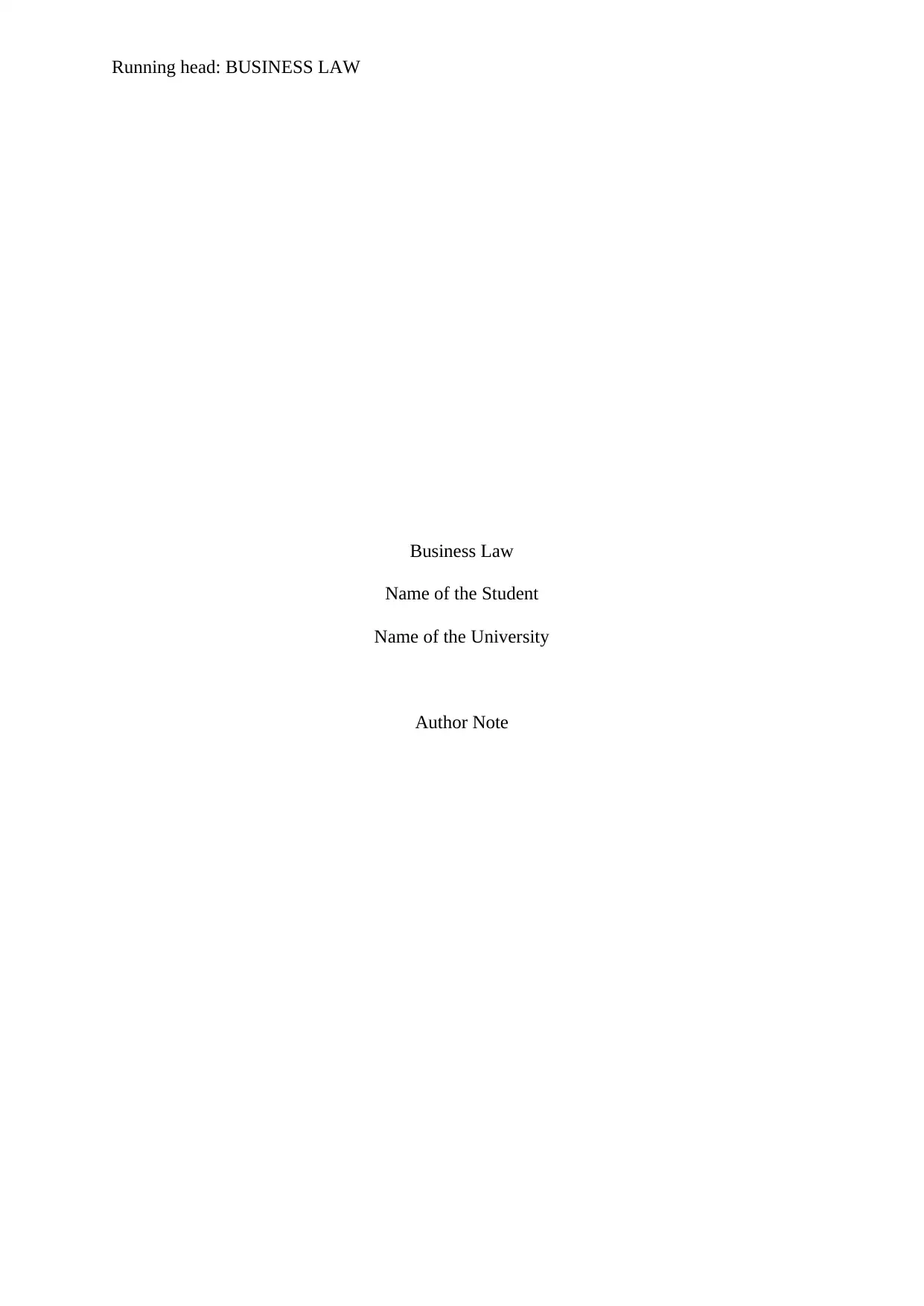
Running head: BUSINESS LAW
Business Law
Name of the Student
Name of the University
Author Note
Business Law
Name of the Student
Name of the University
Author Note
Paraphrase This Document
Need a fresh take? Get an instant paraphrase of this document with our AI Paraphraser

1
BUSINESS LAW
Table of Contents
Issue 1.............................................................................................................................2
Issue 2.............................................................................................................................4
References......................................................................................................................6
BUSINESS LAW
Table of Contents
Issue 1.............................................................................................................................2
Issue 2.............................................................................................................................4
References......................................................................................................................6
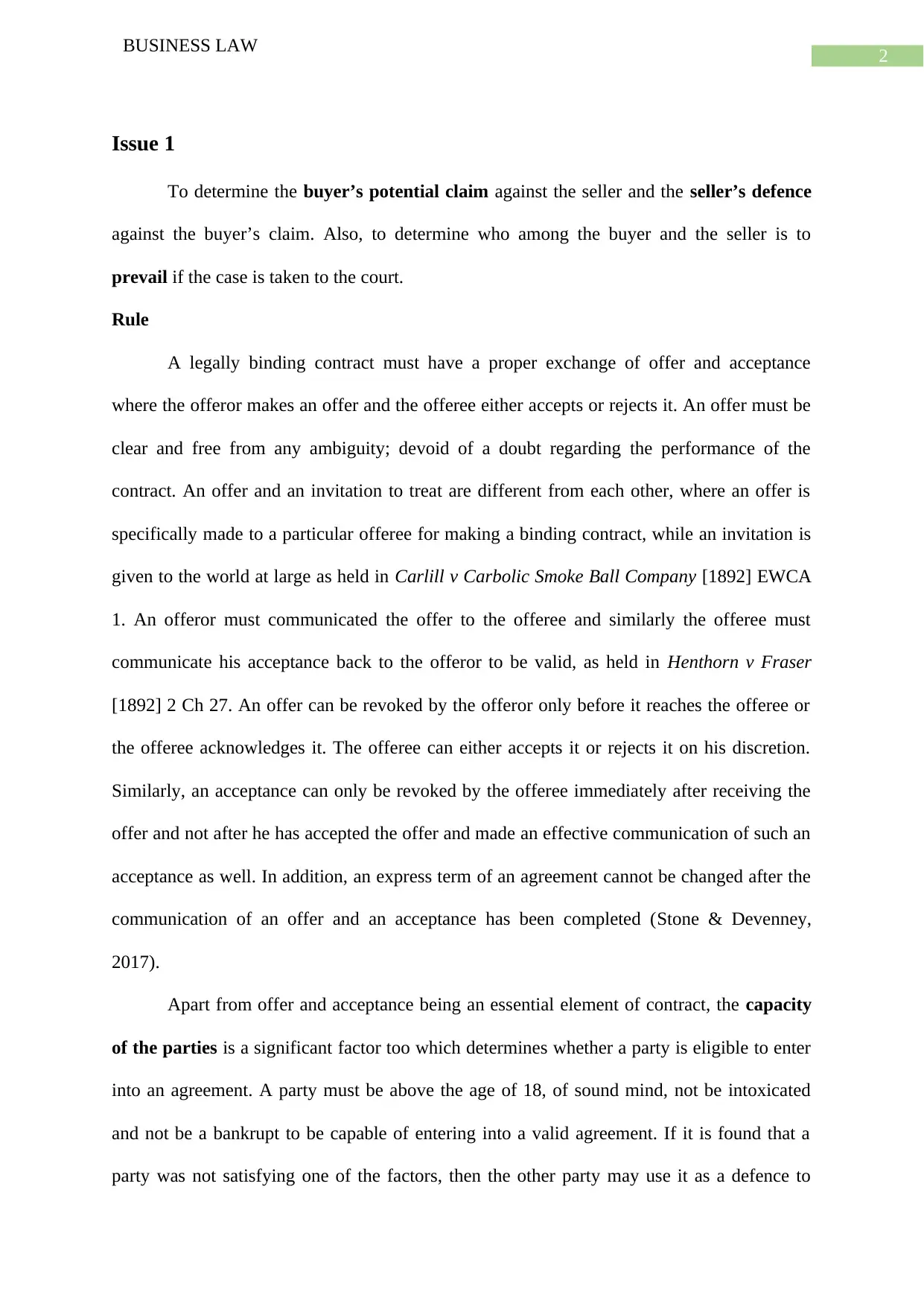
2
BUSINESS LAW
Issue 1
To determine the buyer’s potential claim against the seller and the seller’s defence
against the buyer’s claim. Also, to determine who among the buyer and the seller is to
prevail if the case is taken to the court.
Rule
A legally binding contract must have a proper exchange of offer and acceptance
where the offeror makes an offer and the offeree either accepts or rejects it. An offer must be
clear and free from any ambiguity; devoid of a doubt regarding the performance of the
contract. An offer and an invitation to treat are different from each other, where an offer is
specifically made to a particular offeree for making a binding contract, while an invitation is
given to the world at large as held in Carlill v Carbolic Smoke Ball Company [1892] EWCA
1. An offeror must communicated the offer to the offeree and similarly the offeree must
communicate his acceptance back to the offeror to be valid, as held in Henthorn v Fraser
[1892] 2 Ch 27. An offer can be revoked by the offeror only before it reaches the offeree or
the offeree acknowledges it. The offeree can either accepts it or rejects it on his discretion.
Similarly, an acceptance can only be revoked by the offeree immediately after receiving the
offer and not after he has accepted the offer and made an effective communication of such an
acceptance as well. In addition, an express term of an agreement cannot be changed after the
communication of an offer and an acceptance has been completed (Stone & Devenney,
2017).
Apart from offer and acceptance being an essential element of contract, the capacity
of the parties is a significant factor too which determines whether a party is eligible to enter
into an agreement. A party must be above the age of 18, of sound mind, not be intoxicated
and not be a bankrupt to be capable of entering into a valid agreement. If it is found that a
party was not satisfying one of the factors, then the other party may use it as a defence to
BUSINESS LAW
Issue 1
To determine the buyer’s potential claim against the seller and the seller’s defence
against the buyer’s claim. Also, to determine who among the buyer and the seller is to
prevail if the case is taken to the court.
Rule
A legally binding contract must have a proper exchange of offer and acceptance
where the offeror makes an offer and the offeree either accepts or rejects it. An offer must be
clear and free from any ambiguity; devoid of a doubt regarding the performance of the
contract. An offer and an invitation to treat are different from each other, where an offer is
specifically made to a particular offeree for making a binding contract, while an invitation is
given to the world at large as held in Carlill v Carbolic Smoke Ball Company [1892] EWCA
1. An offeror must communicated the offer to the offeree and similarly the offeree must
communicate his acceptance back to the offeror to be valid, as held in Henthorn v Fraser
[1892] 2 Ch 27. An offer can be revoked by the offeror only before it reaches the offeree or
the offeree acknowledges it. The offeree can either accepts it or rejects it on his discretion.
Similarly, an acceptance can only be revoked by the offeree immediately after receiving the
offer and not after he has accepted the offer and made an effective communication of such an
acceptance as well. In addition, an express term of an agreement cannot be changed after the
communication of an offer and an acceptance has been completed (Stone & Devenney,
2017).
Apart from offer and acceptance being an essential element of contract, the capacity
of the parties is a significant factor too which determines whether a party is eligible to enter
into an agreement. A party must be above the age of 18, of sound mind, not be intoxicated
and not be a bankrupt to be capable of entering into a valid agreement. If it is found that a
party was not satisfying one of the factors, then the other party may use it as a defence to
⊘ This is a preview!⊘
Do you want full access?
Subscribe today to unlock all pages.

Trusted by 1+ million students worldwide
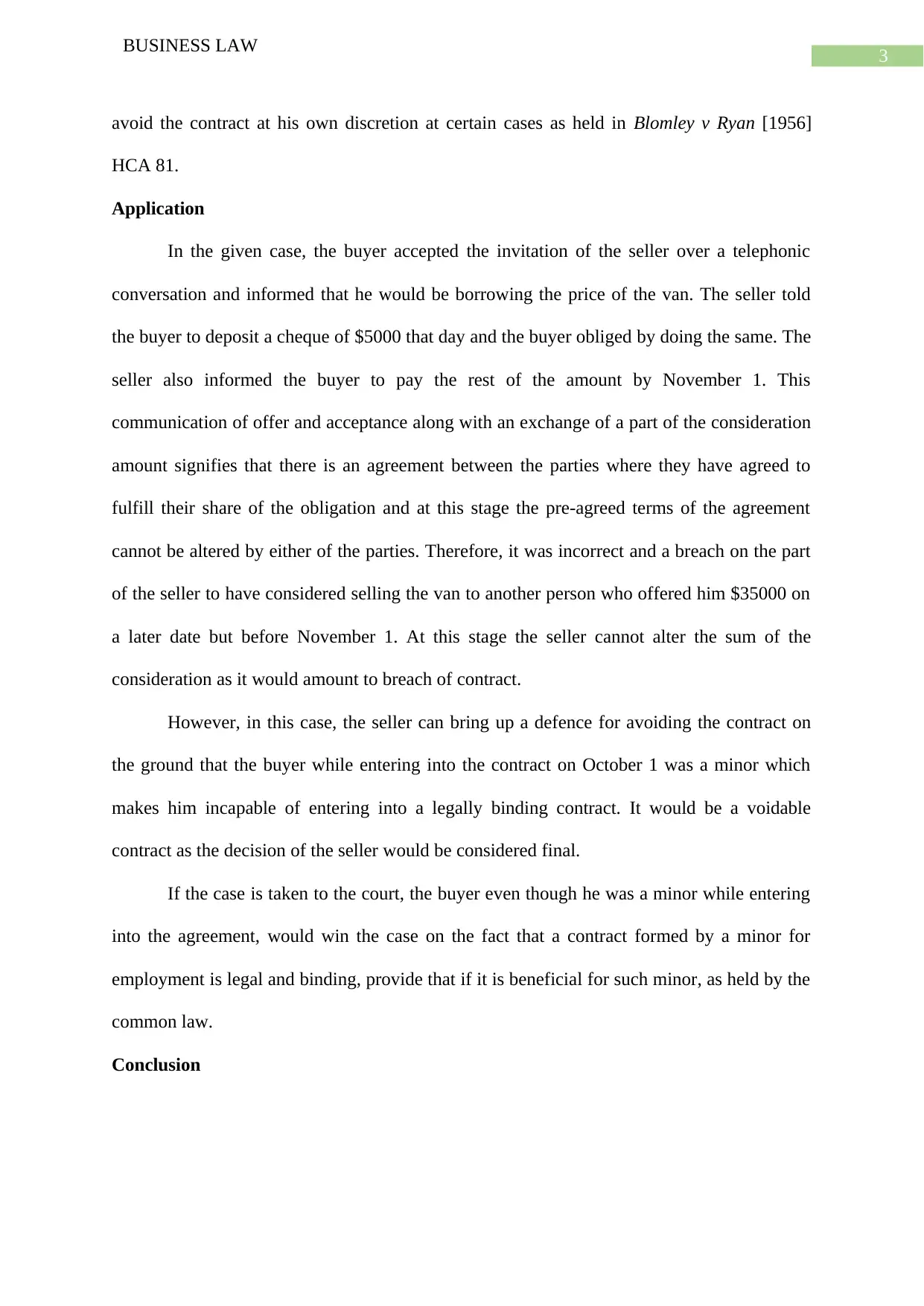
3
BUSINESS LAW
avoid the contract at his own discretion at certain cases as held in Blomley v Ryan [1956]
HCA 81.
Application
In the given case, the buyer accepted the invitation of the seller over a telephonic
conversation and informed that he would be borrowing the price of the van. The seller told
the buyer to deposit a cheque of $5000 that day and the buyer obliged by doing the same. The
seller also informed the buyer to pay the rest of the amount by November 1. This
communication of offer and acceptance along with an exchange of a part of the consideration
amount signifies that there is an agreement between the parties where they have agreed to
fulfill their share of the obligation and at this stage the pre-agreed terms of the agreement
cannot be altered by either of the parties. Therefore, it was incorrect and a breach on the part
of the seller to have considered selling the van to another person who offered him $35000 on
a later date but before November 1. At this stage the seller cannot alter the sum of the
consideration as it would amount to breach of contract.
However, in this case, the seller can bring up a defence for avoiding the contract on
the ground that the buyer while entering into the contract on October 1 was a minor which
makes him incapable of entering into a legally binding contract. It would be a voidable
contract as the decision of the seller would be considered final.
If the case is taken to the court, the buyer even though he was a minor while entering
into the agreement, would win the case on the fact that a contract formed by a minor for
employment is legal and binding, provide that if it is beneficial for such minor, as held by the
common law.
Conclusion
BUSINESS LAW
avoid the contract at his own discretion at certain cases as held in Blomley v Ryan [1956]
HCA 81.
Application
In the given case, the buyer accepted the invitation of the seller over a telephonic
conversation and informed that he would be borrowing the price of the van. The seller told
the buyer to deposit a cheque of $5000 that day and the buyer obliged by doing the same. The
seller also informed the buyer to pay the rest of the amount by November 1. This
communication of offer and acceptance along with an exchange of a part of the consideration
amount signifies that there is an agreement between the parties where they have agreed to
fulfill their share of the obligation and at this stage the pre-agreed terms of the agreement
cannot be altered by either of the parties. Therefore, it was incorrect and a breach on the part
of the seller to have considered selling the van to another person who offered him $35000 on
a later date but before November 1. At this stage the seller cannot alter the sum of the
consideration as it would amount to breach of contract.
However, in this case, the seller can bring up a defence for avoiding the contract on
the ground that the buyer while entering into the contract on October 1 was a minor which
makes him incapable of entering into a legally binding contract. It would be a voidable
contract as the decision of the seller would be considered final.
If the case is taken to the court, the buyer even though he was a minor while entering
into the agreement, would win the case on the fact that a contract formed by a minor for
employment is legal and binding, provide that if it is beneficial for such minor, as held by the
common law.
Conclusion
Paraphrase This Document
Need a fresh take? Get an instant paraphrase of this document with our AI Paraphraser
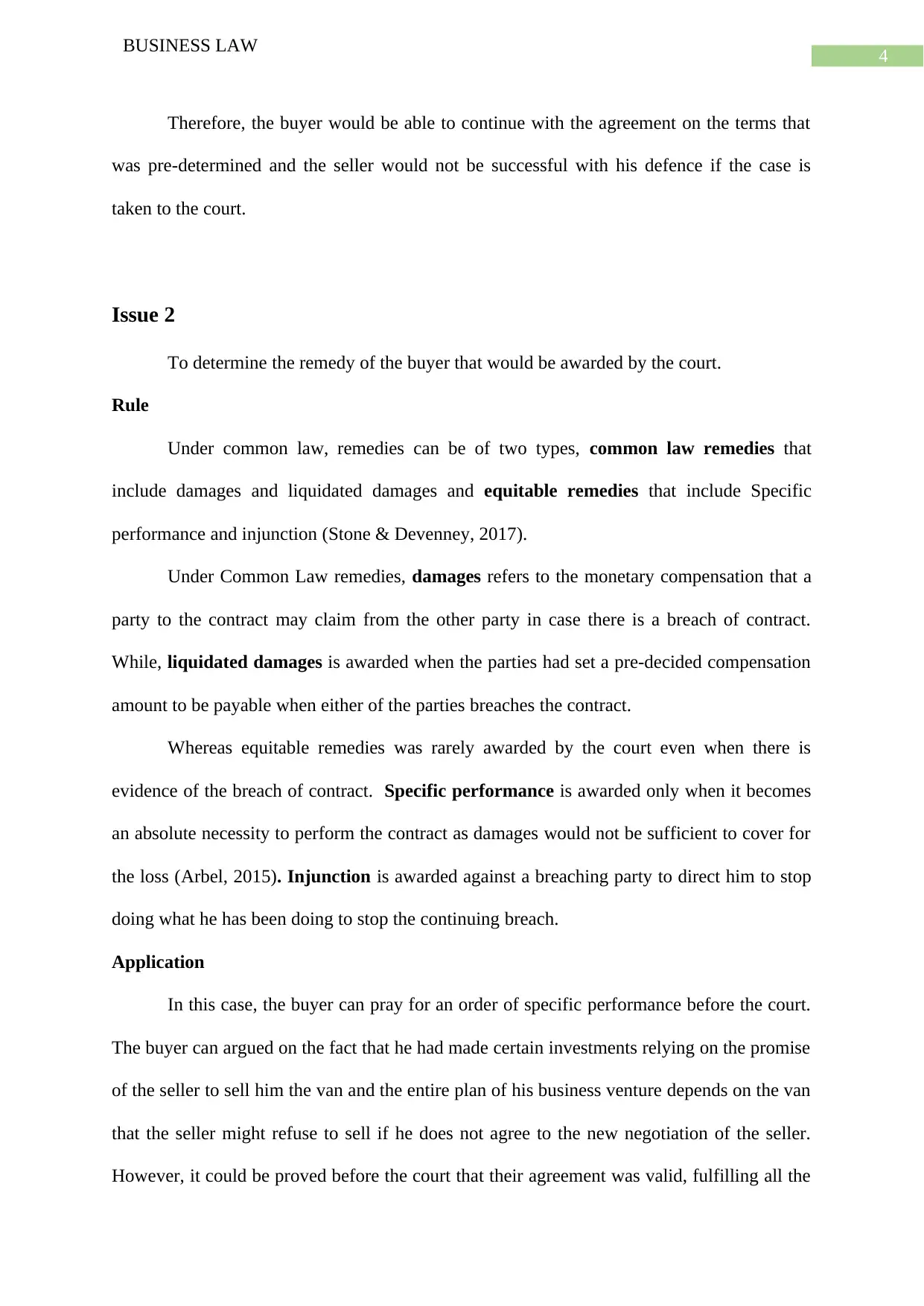
4
BUSINESS LAW
Therefore, the buyer would be able to continue with the agreement on the terms that
was pre-determined and the seller would not be successful with his defence if the case is
taken to the court.
Issue 2
To determine the remedy of the buyer that would be awarded by the court.
Rule
Under common law, remedies can be of two types, common law remedies that
include damages and liquidated damages and equitable remedies that include Specific
performance and injunction (Stone & Devenney, 2017).
Under Common Law remedies, damages refers to the monetary compensation that a
party to the contract may claim from the other party in case there is a breach of contract.
While, liquidated damages is awarded when the parties had set a pre-decided compensation
amount to be payable when either of the parties breaches the contract.
Whereas equitable remedies was rarely awarded by the court even when there is
evidence of the breach of contract. Specific performance is awarded only when it becomes
an absolute necessity to perform the contract as damages would not be sufficient to cover for
the loss (Arbel, 2015). Injunction is awarded against a breaching party to direct him to stop
doing what he has been doing to stop the continuing breach.
Application
In this case, the buyer can pray for an order of specific performance before the court.
The buyer can argued on the fact that he had made certain investments relying on the promise
of the seller to sell him the van and the entire plan of his business venture depends on the van
that the seller might refuse to sell if he does not agree to the new negotiation of the seller.
However, it could be proved before the court that their agreement was valid, fulfilling all the
BUSINESS LAW
Therefore, the buyer would be able to continue with the agreement on the terms that
was pre-determined and the seller would not be successful with his defence if the case is
taken to the court.
Issue 2
To determine the remedy of the buyer that would be awarded by the court.
Rule
Under common law, remedies can be of two types, common law remedies that
include damages and liquidated damages and equitable remedies that include Specific
performance and injunction (Stone & Devenney, 2017).
Under Common Law remedies, damages refers to the monetary compensation that a
party to the contract may claim from the other party in case there is a breach of contract.
While, liquidated damages is awarded when the parties had set a pre-decided compensation
amount to be payable when either of the parties breaches the contract.
Whereas equitable remedies was rarely awarded by the court even when there is
evidence of the breach of contract. Specific performance is awarded only when it becomes
an absolute necessity to perform the contract as damages would not be sufficient to cover for
the loss (Arbel, 2015). Injunction is awarded against a breaching party to direct him to stop
doing what he has been doing to stop the continuing breach.
Application
In this case, the buyer can pray for an order of specific performance before the court.
The buyer can argued on the fact that he had made certain investments relying on the promise
of the seller to sell him the van and the entire plan of his business venture depends on the van
that the seller might refuse to sell if he does not agree to the new negotiation of the seller.
However, it could be proved before the court that their agreement was valid, fulfilling all the
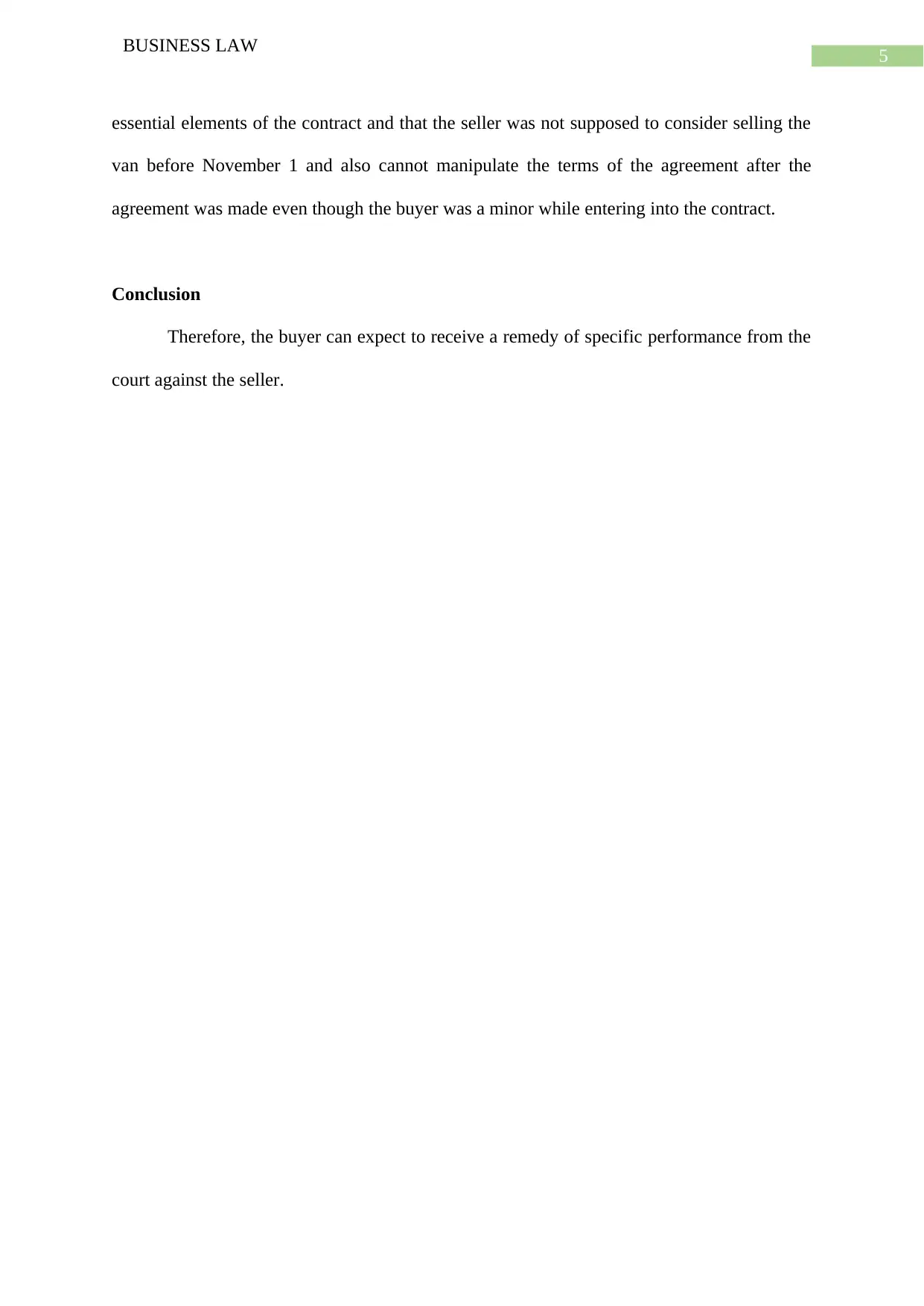
5
BUSINESS LAW
essential elements of the contract and that the seller was not supposed to consider selling the
van before November 1 and also cannot manipulate the terms of the agreement after the
agreement was made even though the buyer was a minor while entering into the contract.
Conclusion
Therefore, the buyer can expect to receive a remedy of specific performance from the
court against the seller.
BUSINESS LAW
essential elements of the contract and that the seller was not supposed to consider selling the
van before November 1 and also cannot manipulate the terms of the agreement after the
agreement was made even though the buyer was a minor while entering into the contract.
Conclusion
Therefore, the buyer can expect to receive a remedy of specific performance from the
court against the seller.
⊘ This is a preview!⊘
Do you want full access?
Subscribe today to unlock all pages.

Trusted by 1+ million students worldwide
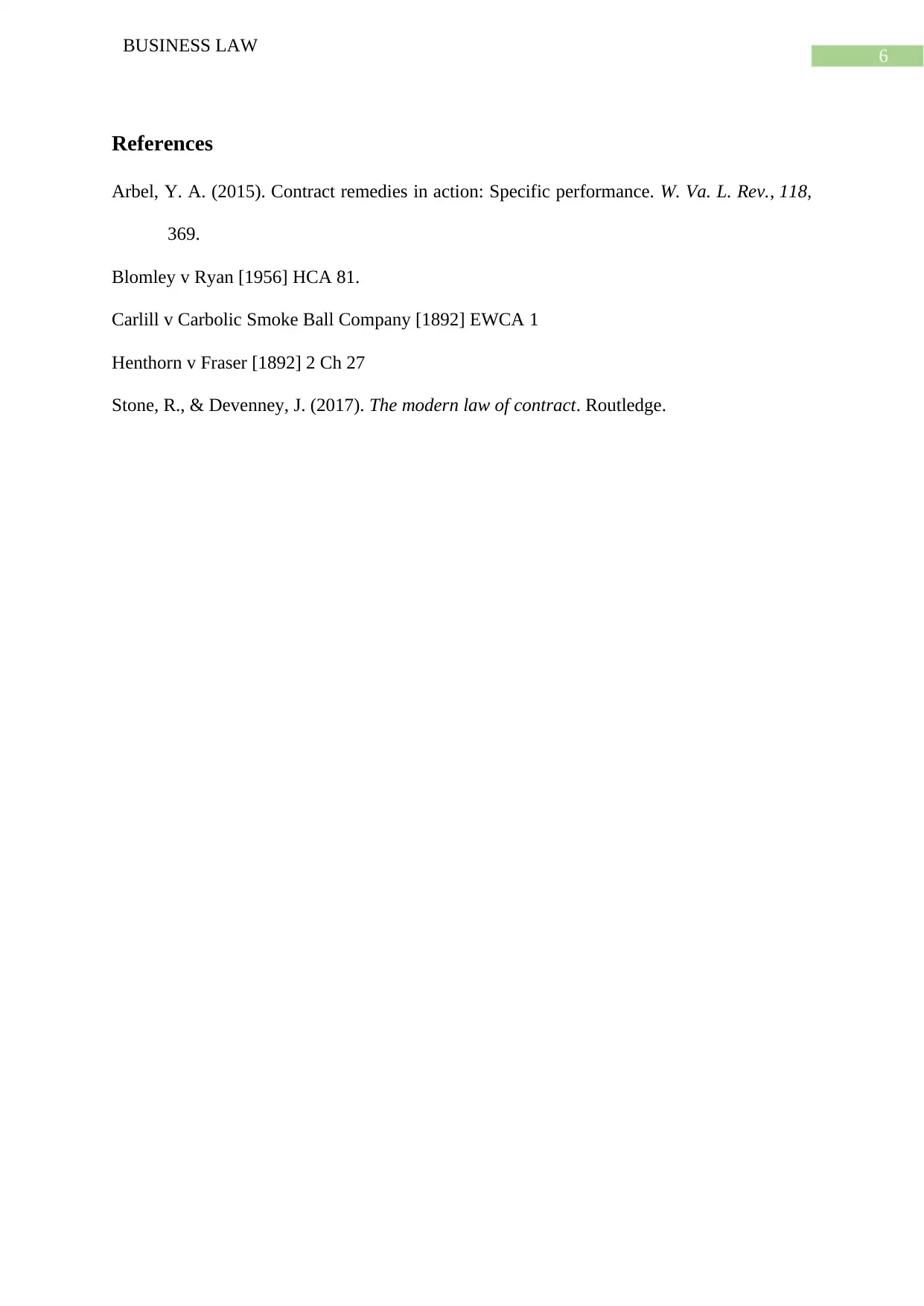
6
BUSINESS LAW
References
Arbel, Y. A. (2015). Contract remedies in action: Specific performance. W. Va. L. Rev., 118,
369.
Blomley v Ryan [1956] HCA 81.
Carlill v Carbolic Smoke Ball Company [1892] EWCA 1
Henthorn v Fraser [1892] 2 Ch 27
Stone, R., & Devenney, J. (2017). The modern law of contract. Routledge.
BUSINESS LAW
References
Arbel, Y. A. (2015). Contract remedies in action: Specific performance. W. Va. L. Rev., 118,
369.
Blomley v Ryan [1956] HCA 81.
Carlill v Carbolic Smoke Ball Company [1892] EWCA 1
Henthorn v Fraser [1892] 2 Ch 27
Stone, R., & Devenney, J. (2017). The modern law of contract. Routledge.
1 out of 7
Related Documents
Your All-in-One AI-Powered Toolkit for Academic Success.
+13062052269
info@desklib.com
Available 24*7 on WhatsApp / Email
![[object Object]](/_next/static/media/star-bottom.7253800d.svg)
Unlock your academic potential
Copyright © 2020–2026 A2Z Services. All Rights Reserved. Developed and managed by ZUCOL.





